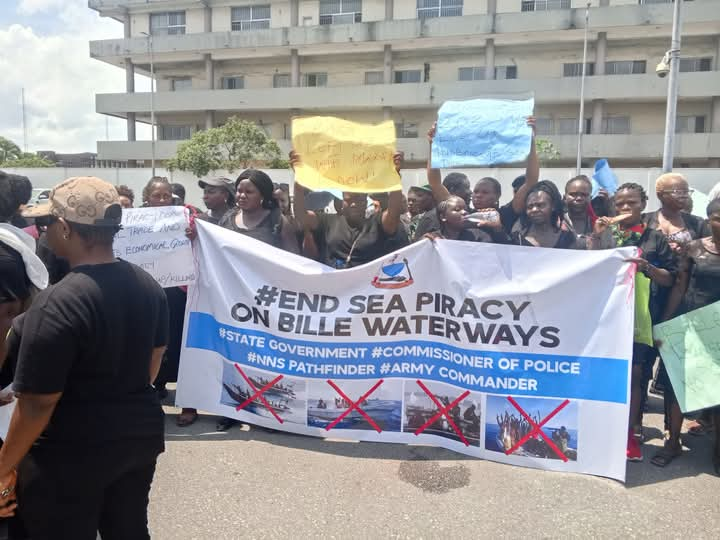The serene waterways connecting Port Harcourt and Bille, a vital lifeline for the riverine communities of Rivers State, Nigeria, became a scene of terror and despair on May 6, 2025. Suspected pirates, wielding a potent combination of firepower and ruthlessness, hijacked three boats navigating the route, plundering goods worth millions of Naira and abducting 13 innocent passengers. This brazen act of piracy, unfortunately, is not an isolated incident, but rather the latest in a disturbingly frequent pattern of attacks plaguing the region’s waterways. The incident has sparked widespread outrage and fear, particularly amongst the residents of Bille, who rely heavily on these waterways for transport and trade. Adding a layer of tragedy to this already dire situation, eight of the abducted passengers were students en route to sit for the West African Senior School Certificate Examination (WASSCE), a crucial step towards their future aspirations. Their dreams, and those of their families, now hang precariously in the balance as they remain captives in the hands of their abductors.
The abduction of the students, along with five other passengers, ignited a wave of protests, particularly amongst the women of Bille Kingdom. Clad in mourning black, they marched to the State Police headquarters and then to the Government House in Port Harcourt, their voices echoing with anguish and determination. They carried placards emblazoned with desperate pleas for government intervention – “Government save us from sea pirates,” “Our children going to write WAEC are with the pirates in the bush; some have been raped,” and “Bille people are suffering in the hands of pirates.” Their chants filled the air, a poignant symphony of sorrow and defiance. Their message was clear: the government must take decisive action to secure the waterways and bring their children home.
The women’s testimonies paint a grim picture of the ordeal faced by their loved ones. Beyond the immediate trauma of abduction, they allege that their daughters have been subjected to the further indignity of rape, while all the captives have been stripped of their belongings. The anguish of a mother, whose son is among the abducted students, was palpable as she flung herself to the ground before the Government House, her cries a heart-wrenching plea for help. “Government please help me my son is inside the River (creek). Sea pirates took him inside the bush. Government please help me bring my son, don’t leave like this,” she implored, her voice raw with despair.
The accounts shared by the protesting women reveal the devastating impact of these recurring pirate attacks on the Bille community. Blessing Alale, one of the protesters, recounted a previous incident where her mother and seven others were kidnapped on the same route. They were released only after a harrowing ordeal and the payment of a staggering N30 million ransom, along with additional demands for fuel, power banks, bread, and water. Alale’s story underscores the financial and emotional toll these attacks exact on the families of the victims. She expressed her profound sadness at the current abduction, highlighting the devastating consequence for the students who have already missed crucial WASSCE papers. The missed exams represent a significant setback to their academic pursuits, jeopardizing their future prospects.
The women’s protest is not merely a cry for help, but a potent indictment of the perceived inaction by the authorities. Their repeated pleas for increased security measures seem to have fallen on deaf ears, leaving them feeling vulnerable and abandoned. The audacity of the pirates, who now target even children en route to school, has shattered any semblance of safety and security in the region. The women’s collective action is a desperate attempt to force the government to acknowledge the severity of the situation and to finally take concrete steps to protect its citizens. Their demands are not simply for the release of their children, but for a comprehensive solution to the pervasive insecurity that plagues their community.
Janet Adebayo, one of the leaders of the protest, formally presented their grievances to a government official. Her address was a poignant articulation of their plight, highlighting the escalating security threats on the waterways and the deep distress and uncertainty gripping the families of the abducted. She urged the government, the police, the army, and the navy to launch immediate rescue operations, intensify surveillance patrols, and ensure the safe return of the victims. The government’s response, though seemingly prompt, remains to be seen in terms of concrete action. The Camp Commandant, O.I. Gabriel, received the women’s letter and assured them of immediate action. While this offers a glimmer of hope, the true measure of the government’s commitment will be the tangible steps taken to secure the waterways and ensure the safe return of the abducted students and other passengers. Police spokesperson, Grace Iringe-Koko, confirmed that investigations are ongoing, promising to bring the perpetrators to justice. The women of Bille, however, await anxiously for real action, hoping that their pleas will not be lost in the bureaucratic maze, and that their children will soon be returned to them safely.














